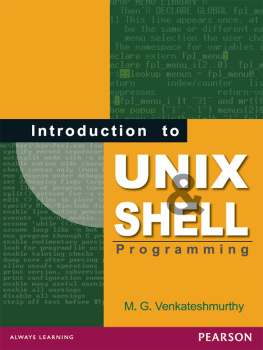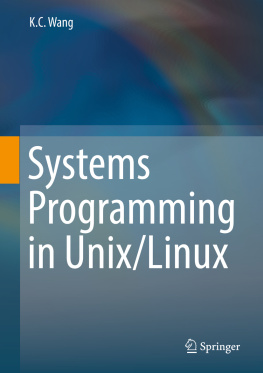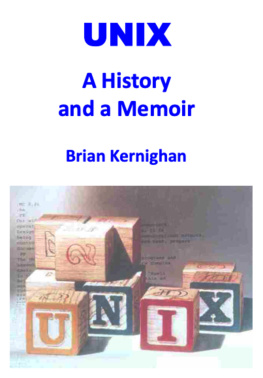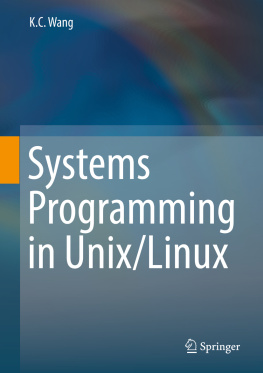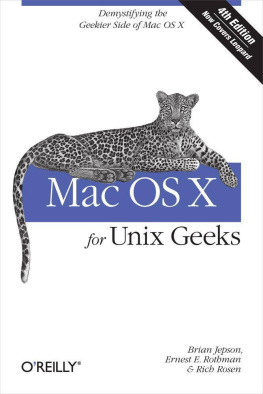Advanced UNIX Programming
Second Edition
Marc J. Rochkind

Boston San Francisco New York Toronto Montreal
London Munich Paris Madrid
Capetown Sydney Tokyo Singapore Mexico City
Many of the designations used by manufacturers and sellers to distinguish their products are claimed as trademarks. Where those designations appear in this book, and Addison-Wesley was aware of a trademark claim, the designations have been printed with initial capital letters or in all capitals.
The author and publisher have taken care in the preparation of this book, but make no expressed or implied warranty of any kind and assume no responsibility for errors or omissions. No liability is assumed for incidental or consequential damages in connection with or arising out of the use of the information or programs contained herein.
The publisher offers discounts on this book when ordered in quantity for bulk purchases and special sales. For more information, please contact:
U.S. Corporate and Government Sales
(800) 382-3419
For sales outside of the U.S., please contact:
International Sales
(317) 581-3793
Visit Addison-Wesley on the Web: www.awprofessional.com
Copyright 2004 by Pearson Education, Inc.
All rights reserved. No part of this publication may be reproduced, stored in a retrieval system, or transmitted, in any form, or by any means, electronic, mechanical, photocopying, recording, or otherwise, without the prior consent of the publisher. Printed in the United States of America. Published simultaneously in Canada.
For information on obtaining permission for use of material from this work, please submit a written request to:
Pearson Education, Inc.
Rights and Contracts Department
75 Arlington Street, Suite 300
Boston, MA 02116
Fax: (617) 848-7047
ISBN 0-13-141154-3
Text printed in the United States on recycled paper at RR Donnelley Crawfordsville in Crawfordsville, Indiana.
6th Printing September 2008
For Claire and Gillian
Contents
Addison-Wesley Professional Computing Series
Brian W. Kernighan, Consulting Editor
Matthew H. Austern, Generic Programming and the STL: Using and Extending the C++ Standard Template Library
David R. Butenhof, Programming with POSIX Threads
Brent Callaghan, NFS Illustrated
Tom Cargill, C++ Programming Style
William R. Cheswick/Steven M. Bellovin/Aviel D. Rubin, Firewalls and Internet Security, Second Edition: Repelling the Wily Hacker
David A. Curry, UNIX System Security: A Guide for Users and System Administrators
Stephen C. Dewhurst, C++ Gotchas: Avoiding Common Problems in Coding and Design
Dan Farmer/Wietse Venema, Forensic Discovery
Erich Gamma/Richard Helm/Ralph Johnson/John Vlissides, Design Patterns: Elements of Reusable Object-Oriented Software
Erich Gamma/Richard Helm/Ralph Johnson/John Vlissides, Design Patterns CD: Elements of Reusable Object-Oriented Software
Peter Haggar, Practical Java Programming Language Guide
David R. Hanson, C Interfaces and Implementations: Techniques for Creating Reusable Software
Mark Harrison/Michael McLennan, Effective Tcl/Tk Programming: Writing Better Programs with Tcl and Tk
Michi Henning/Steve Vinoski, Advanced CORBA Programming with C++
Brian W. Kernighan/Rob Pike, The Practice of Programming
S. Keshav, An Engineering Approach to Computer Networking: ATM Networks, the Internet, and the Telephone Network
John Lakos, Large-Scale C++ Software Design
Scott Meyers, Effective C++ CD: 85 Specific Ways to Improve Your Programs and Designs
Scott Meyers, Effective C++, Third Edition: 55 Specific Ways to Improve Your Programs and Designs
Scott Meyers, More Effective C++: 35 New Ways to Improve Your Programs and Designs
Scott Meyers, Effective STL: 50 Specific Ways to Improve Your Use of the Standard Template Library
Robert B. Murray, C++ Strategies and Tactics
David R. Musser/Gillmer J. Derge/Atul Saini, STL Tutorial and Reference Guide, Second Edition: C++ Programming with the Standard Template Library
John K. Ousterhout, Tcl and the Tk Toolkit
Craig Partridge, Gigabit Networking
Radia Perlman, Interconnections, Second Edition: Bridges, Routers, Switches, and Internetworking Protocols
Stephen A. Rago, UNIX System V Network Programming
Eric S. Raymond, The Art of UNIX Programming
Marc J. Rochkind, Advanced UNIX Programming, Second Edition
Curt Schimmel, UNIX Systems for Modern Architectures: Symmetric Multiprocessing and Caching for Kernel Programmers
W. Richard Stevens, TCP/IP Illustrated, Volume 1: The Protocols
W. Richard Stevens, TCP/IP Illustrated, Volume 3: TCP for Transactions, HTTP, NNTP, and the UNIX Domain Protocols
W. Richard Stevens/Bill Fenner/Andrew M. Rudoff, UNIX Network Programming Volume 1, Third Edition: The Sockets Networking API
W. Richard Stevens/Stephen A. Rago, Advanced Programming in the UNIX Environment, Second Edition
W. Richard Stevens/Gary R. Wright, TCP/IP Illustrated Volumes 1-3 Boxed Set
John Viega/Gary McGraw, Building Secure Software: How to Avoid Security Problems the Right Way
Gary R. Wright/W. Richard Stevens, TCP/IP Illustrated, Volume 2: The Implementation
Ruixi Yuan/W. Timothy Strayer, Virtual Private Networks: Technologies and Solutions
Visit www.awprofessional.com/series/professionalcomputing for more information about these titles.
Preface
This book updates the 1985 edition of Advanced UNIX Programming to cover a few changes that have occurred in the last eighteen years. Well, maybe few isnt the right word! And updates isnt right either. Indeed, aside from a sentence here and there, this book is all new. The first edition included about 70 system calls; this one includes about 300. And none of the UNIX standards and implementations discussed in this bookPOSIX, Solaris, Linux, FreeBSD, and Darwin (Mac OS X)were even around in 1985. A few sentences from the 1985 Preface, however, are among those that I can leave almost unchanged:
The subject of this book is UNIX system callsthe interface between the UNIX kernel and the user programs that run on top of it. Those who interact only with commands, like the shell, text editors, and other application programs, may have little need to know much about system calls, but a thorough knowledge of them is essential for UNIX programmers. System calls are the only way to access kernel facilities such as the file system, the multitasking mechanisms, and the interprocess communication primitives.
System calls define what UNIX is. Everything elsesubroutines and commandsis built on this foundation. While the novelty of many of these higher-level programs has been responsible for much of UNIXs renown, they could as well have been programmed on any modern operating system. When one describes UNIX as elegant, simple, efficient, reliable, and portable, one is referring not to the commands (some of which are none of these things), but to the kernel.
Thats all still true, except that, regrettably, the programming interface to the kernel is no longer elegant or simple. In fact, because UNIX development has splintered into many directions over the last couple of decades, and because the principal standards organization, The Open Group, sweeps up almost everything thats out there (1108 functions altogether), the interface is clumsy, inconsistent, redundant, error-prone, and confusing. But its still efficient, reliably implemented, and portable, and thats why UNIX and UNIX-like systems are so successful. Indeed, the UNIX system-call interface is the only widely implemented portable one we have and are likely to have in our lifetime.


